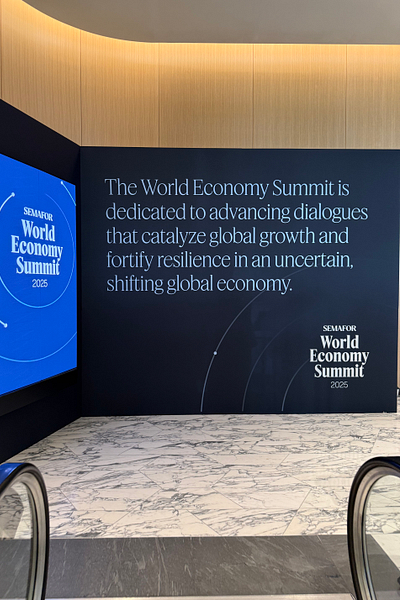World Economy Summit 2025 (Semafor, Washington DC): Part 2
Tariffs significantly impact the automotive industry. AI and data ownership are critical for individual empowerment. Geopolitical tensions with China are reshaping trade dynamics.
We attended the World Economy Summit organized by Semafor in April 2025, and it was amazing to listen to the heads of a number of Fortune 500 companies.
This conversation explores the rapid advancements in technology, particularly in the automotive industry, the impact of tariffs, the state of digital infrastructure, and the evolving landscape of payment solutions. It delves into the importance of AI and data ownership, the dynamics of social media, and the role of augmented reality. The discussion also touches on privacy concerns, government spending, and the empowerment of small businesses through AI. Finally, it addresses the critical nature of US-China trade relations for global economic stability. This conversation delves into the complexities of global trade, the resilience of economies, and the evolving landscape of investment and entrepreneurship. It highlights the intertwined nature of global manufacturing, the challenges faced by small businesses, and the impact of AI on various sectors. The discussion also touches on the geopolitical implications of U.S.-China relations and the importance of supporting entrepreneurs to prevent burnout. This conversation delves into the transformative impact of innovative computing and battery technology, the future of energy generation, and the challenges posed by technological disruption on jobs. It explores the role of AI in revolutionizing travel and enhancing market resilience, while also addressing the evolution of the space economy and the importance of training managers to optimize productivity in enterprises. The discussion emphasizes the need for leadership in navigating these changes and the critical role of predictability in driving economic growth. The conversation explores the challenges and opportunities in AI adoption within organizations, emphasizing the gap between management's implementation of AI programs and actual employee engagement. It highlights the importance of effective communication and feedback culture in fostering a productive workplace, as well as the generational differences in employee expectations. The discussion also touches on government efficiency, the role of technology in national security, and the future of energy and manufacturing, particularly in relation to education funding and outcomes.
Takeaways
Technological advancement is accelerating rapidly.
Tariffs significantly impact the automotive industry.
Investment in US manufacturing is crucial for competitiveness.
Digital infrastructure is perceived as world-class, but readiness for future challenges is lacking.
AI and data ownership are critical for individual empowerment.
Social media dynamics are shifting towards influencer content.
Augmented reality can enhance shared experiences.
Privacy is essential for free expression in digital communication.
Government spending is largely mandatory and limits flexibility.
AI can empower small businesses by leveraging data.
Data organization is a major challenge for AI deployment.
India is emerging as a leader in AI applications.
US-China trade relations are vital for global economic stability. The U.S. is heavily reliant on global supply chains, particularly from China.
Economic resilience has been observed despite global challenges.
Investment trends are shifting towards technology and infrastructure.
Geopolitical tensions with China are reshaping trade dynamics.
Small businesses face significant challenges in navigating tariffs and customs.
Cash flow remains a critical issue for small enterprises.
The creator economy is expanding, with more individuals starting businesses.
Support systems for entrepreneurs are essential to prevent burnout.
AI is transforming business operations and content creation.
Cybersecurity threats are evolving with advancements in AI. Innovative computing is reshaping how we approach technology.
Battery technology is crucial for renewable energy solutions.
Nuclear energy has potential for long-term energy generation.
Technological disruption poses risks to job security.
AI can revolutionize travel experiences for consumers.
Market resilience is essential for investor confidence.
The space economy is evolving with public-private partnerships.
AI implementation faces challenges in enterprise settings.
Management training is vital for improving productivity.
Predictability drives economic growth and investment decisions. 97% of CHROs have rolled out AI programs, but 67% of employees don't use them.
Effective managers are crucial for AI adoption in organizations.
Clear expectations are essential for both AI and human intelligence.
Half of all workers globally don't know what's expected of them at work.
The U.S. economy needs more people involved to maintain its resilience.
Communication tools are vital for employee engagement and culture.
Generational differences affect how employees connect with company purpose.
Government efficiency is a pressing issue that needs addressing.
AI is being tested in national security and space applications.
Fusion energy is on the horizon, promising significant advancements.
Chapters
00:00 The Journey of Technological Advancement
06:13 Digital Infrastructure: Current State and Future Challenges
12:04 Investment Standards and Economic Order
18:06 Social Media Dynamics and User Engagement
23:54 Privacy in Digital Communication
30:00 AI's Role in Small Business Empowerment
35:59 India's Role in AI Development
43:01 Global Manufacturing and Trade Dynamics
49:04 Investment Trends and Sector Focus
56:28 Challenges for Small Businesses in Trade
01:03:01 The Rise of the Creator Economy
01:09:29 AI's Impact on Business and Content Creation
01:16:46 Innovation and Market Dynamics in Technology
01:23:39 Innovative Computing and Battery Technology
01:31:41 Navigating Technological Disruption and Job Loss
01:39:39 The Evolution of Space Economy
01:45:00 The Role of Management in Productivity
02:01:34 Training Managers for Success
02:09:30 Feedback Culture and Communication
02:17:09 AI in National Security and Space
02:24:27 Education Funding and Outcomes
02:30:02 The Future of Energy and Manufacturing
Sessions
Transcript
Snowpal Products
Backends as Services on AWS Marketplace
Mobile Apps on App Store and Play Store
Web App
Education Platform for Learners and Course Creators



